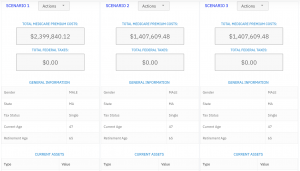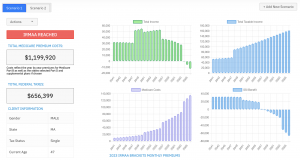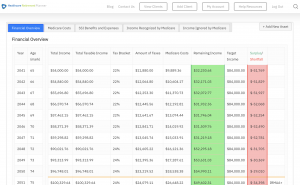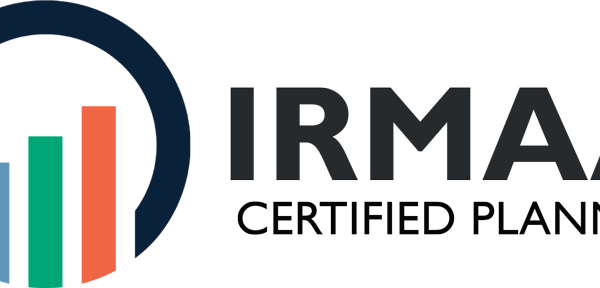Have you ever found yourself staring at your Social Security benefit check, noticing a few dollars missing? It’s not a mystery or an error. Rather, it’s likely the cost of your Medicare premiums being automatically deducted. This leads to the question many retirees and future beneficiaries ask: is it mandatory to have medicare deducted from social security? The answer isn’t as straightforward as one might hope.
The process is like having taxes taken out of a paycheck; you don’t see the money because it goes directly towards something else – in this case, your healthcare coverage. But does everyone go through this automatic deduction dance? What if you want to cha-cha away with that amount still snug in your bank account?
Situations vary widely among individuals based on their income levels and whether they’re even drawing Social Security benefits yet. For some, deductions are part of the monthly routine, barely noticeable except for those meticulously tracking every penny.
Navigating the confluence of healthcare and nest egg reserves often leaves folks puzzled, eager to unravel this intricate web. Let’s peel back the layers to understand this complex relationship better. Delving into the intricate dance between preparing for future health needs and saving for retirement is key to ensuring your financial stability down the road.
Understanding Medicare Deductions from Social Security
If you’re juggling both social security and medicare, here’s the lowdown on how they play together. It’s like a dance between two partners who need to stay in sync for everything to go smoothly.
The Role of Social Security in Medicare Premiums
Social security isn’t just about retirement cash; it also plays a crucial role in handling your Medicare premiums. Think of it as your financial buddy making sure part of your healthcare costs are covered without you breaking a sweat.
The Process of Medicare Deduction from Social Security
So, what’s the secret behind these deductions seamlessly happening? If you get monthly social security benefits, bingo. Your medicare premium gets automatically deducted. This means less hassle for you since there’s no need to remember payment deadlines or write checks. Smooth sailing.
Is it Mandatory to Have Medicare Deducted from Social Security?
Ever wondered if Uncle Sam makes it a must to have your Medicare premiums take a little vacation out of your Social Security benefits each month? Let’s clear the air.
Circumstances Where Medicare is Automatically Deducted
If you’re soaking up those Social Security benefits, guess what? Your Medicare Part B premiums will hitch a ride and get automatically deducted. It’s like they’re joined at the hip.
Exceptions to Automatic Deductions
But here’s where it gets interesting. Not on that Social Security train yet? You’ve got options. With no benefit checks coming in, you can set things up for those premiums to dip directly from your bank account instead—checking or savings, dealer’s choice.
Talking about flexibility and having control over how we manage our golden years finances—pretty cool, right?
Impact of Income on Medicare Premiums
How Higher Income Affects Your Premiums
Did you know that if you’re raking in more dough, your Medicare premiums could see a hike? Yep, it’s true. The more you earn, the higher premium you might pay for Medicare Part B and D. This is thanks to something called the income-related monthly adjustment amount (IRMAA).
Tax Returns and Your Premiums
In this scene, your tax documents take center stage. The IRS shares your adjusted gross income with CMS to decide if you owe an IRMAA. So, if your income crosses certain thresholds ($88k for individuals or $176k for couples filing jointly in 2024), brace yourself for a higher bill.
Buckle up. Managing healthcare costs means keeping an eye on those earnings and understanding how they impact what comes out of your pocket.
Payment Options for Medicare Premiums
Paying your Medicare bill doesn’t have to be a headache. You’ve got options, lots of them. Let’s break it down.
Different Ways to Pay Your Medicare Bill
- Online: Whip out that credit or debit card and pay via MyMedicare.gov. It’s quick, like skipping the line at your favorite coffee shop.
- Mail: Old school? No problem. Send a check, money order, or even use your credit/debit card details on the payment coupon you get in the mail.
- Automatic withdrawals: With Medicare Easy Pay, it’s set-and-forget. Each month, they’ll dip into your bank account – no sweat off your back.
- Your bank’s online service: Some banks offer this nifty feature where they handle everything for you – just make sure they don’t charge extra.
What Happens if You Miss a Payment?
A missed payment is more than an “oops” moment; it can disrupt your coverage. But don’t panic yet. If trouble bubbles up with automatic payments or anything else goes sideways, Medicare sends you a letter faster than grandma with birthday cash – telling you how to fix things up and keep those benefits rolling.
The Relationship Between Medicare Parts and Social Security
Ever wondered how your hard-earned Social Security benefits interact with the different parts of Medicare? Let’s break it down.
Can Medicare Part A, B, C, and D Premiums Be Deducted From Social Security?
Absolutely. If you’re receiving those valuable Social Security benefits, you can have your Medicare premiums for Part A, B, C (that’s your Advantage Plans), and even D (that’s prescription drugs) deducted directly from your check. It’s like setting a playlist on shuffle – everything runs smoothly without you having to lift a finger.
What If You Don’t Receive A Social Security Benefit Check?
No worries. Not receiving a benefit check doesn’t leave you in a bind. You’ve got options like paying through the convenient Medicare Easy Pay, writing checks in the traditional way, or using online payments. Even if you miss getting your benefit check, there’s no need to worry; keeping your coverage going is always possible through various means.
Additional Resources for Understanding Medicare and Social Security
Diving into the world of Medicare and Social Security can feel like decoding a secret language. But don’t worry, we’ve got your back with some go-to resources.
Where to Find More Information
Start your quest at Medicare’s official site. It’s a treasure trove of info on health & drug plans that won’t make your head spin.
Who to Contact for Help
If you’re itching to talk to someone real about this, there are options. The folks over at RetireGuide.com are ready to chat. They’re like guides in the wild Medicare jungle.
Finding clarity in the maze of social security online or figuring out how to find health & drug plans just got easier. So take a deep breath; help is closer than you think.
Conclusion
So, is it mandatory to have medicare deducted from social security? The dance between Medicare and Social Security isn’t a tango of fate we’re forced into without choice. It’s more like a carefully choreographed ballet, where understanding your steps can make all the difference.
This journey through the intertwining paths of healthcare coverage and retirement savings has revealed that yes, often these deductions are part of the routine. But exceptions exist, painting a landscape far richer than just black or white rules.
Your income plays its own role in this performance, potentially changing how much you pay for those health benefits dancing off your check before you even see them. And if missing a beat worries you, remember: there are multiple ways to keep the music playing smoothly—options abound for keeping your premiums paid without skipping a step.
The grand takeaway here? Knowledge empowers. Knowing when Medicare will take its share directly from Social Security gives us back control over our financial future—and isn’t that what we’re all striving for after hanging up our work boots?
You’ve now got insights tucked under your belt like secret weapons ready to deploy in planning your secure future because knowing beats guessing any day.
Table of Contents:
- Understanding Medicare Deductions from Social Security
- Is it Mandatory to Have Medicare Deducted from Social Security?
- Impact of Income on Medicare Premiums
- Payment Options for Medicare Premiums
- The Relationship Between Medicare Parts and Social Security
- Additional Resources for Understanding Medicare and Social Security
- Conclusion
Streamlining the Medicare Surcharge Calculation Process.
Our Healthcare Retirement Planner software is designed to streamline the retirement planning process for financial professionals. By providing an efficient way to calculate IRMAA costs, our tool helps you save time and focus on other aspects of your clients’ retirement plans.
- Faster calculations: Our software quickly calculates IRMAA costs based on your client’s income and tax filing status, eliminating manual calculations and potential errors.
- User-friendly interface: The intuitive design of our platform makes it easy for financial professionals to input data and generate results with minimal effort.
- Data integration: Seamlessly integrate our calculator into your existing financial planning tools or CRM systems for a more streamlined workflow.
- Easy to Understand Reports: Export reports to easily share with your clients
- Tax and Surcharge Modeling: see how different types of income affects both taxes and your surcharges.
In addition to simplifying the calculation process, using our Healthcare Retirement Planner can also help improve communication between you and your clients. With clear visuals that illustrate how IRMAA costs impact their overall retirement plan, you can effectively convey complex information in an easily digestible format. This enables clients to make informed decisions about their healthcare expenses during retirement while ensuring they are prepared for any potential changes in Medicare premiums due to income fluctuations. To learn more about how our software can benefit both you as a financial professional and your clients’ retirement planning experience, visit the features page. Streamlining retirement planning processes can help financial professionals save time and resources, allowing them to focus on other areas of their clients’ needs. Automated calculation of IRMAA costs is the next step in streamlining this process even further.





